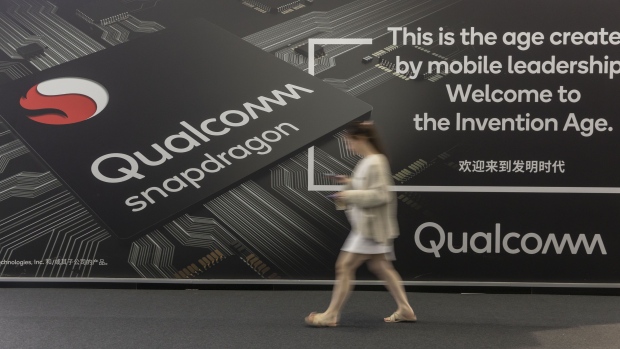Aug 23, 2019
Qualcomm Gets Stay of Injunction in FTC Case From Appeals Court
, Bloomberg News

(Bloomberg) -- Qualcomm Inc. won’t have to renegotiate its patent licenses while appealing an antitrust ruling won by the U.S. Federal Trade Commission, a U.S. appeals court ruled Friday.
Qualcomm has raised “serious questions” about the merits of the trial court’s ruling, the U.S. Court of Appeals for the 9th Circuit said in an order granting a stay. Forcing Qualcomm to enter into new contracts imposes changes that “cannot be easily undone should Qualcomm prevail on appeal,” the three-judge panel in San Francisco said.
U.S. District Judge Lucy Koh found that Qualcomm’s “no license, no chips” policy unfairly leveraged the company’s market position to force customers to pay inflated prices for chips and royalties for their technology. She ordered the company to end the policy and renegotiate some of its contracts for chips and royalties.
Qualcomm has argued that a stay is crucial to its business. Under the original ruling, the company would be forced to renegotiate patent licensing contracts with phone makers, a process that could slash its largest source of profit. Such renegotiations would create binding arrangements that wouldn’t be reversed, even if it were to have the ruling overturned on appeal.
Apple, Samsung
The San Diego-based chipmaker is unusual in the chip industry because it gets the majority of its profit from fees on patents that cover the fundamentals of how modern phone systems work. Apple Inc., Samsung Electronics Co. and all of the world’s biggest phone makers have to pay whether or not they use its chips. That arrangement has caused intense legal fights and regulatory scrutiny around the world for Qualcomm.
The case has split the government. While the FTC argued that Qualcomm harmed competition, the U.S. Department of Justice, as well as the Defense Department and Department of Energy, said the order threatens national security and harms consumers.
“Whether the district court’s order and injunction represent a trailblazing application of the antitrust laws, or instead an improper excursion beyond the outer limits of the Sherman Act, is a matter for another day,” the appeals panel said, referring to the federal antitrust law.
Qualcomm’s appeal will be heard in January, the court said.
The case is Federal Trade Commission v. Qualcomm, 17-220, U.S. Court of Appeals for the 9th Circuit (San Francisco).
(Updates with details of court ruling in second paragraph.)
To contact the reporters on this story: Susan Decker in Washington at sdecker1@bloomberg.net;Ian King in San Francisco at ianking@bloomberg.net
To contact the editors responsible for this story: Jon Morgan at jmorgan97@bloomberg.net, Elizabeth Wasserman, Steve Geimann
©2019 Bloomberg L.P.





